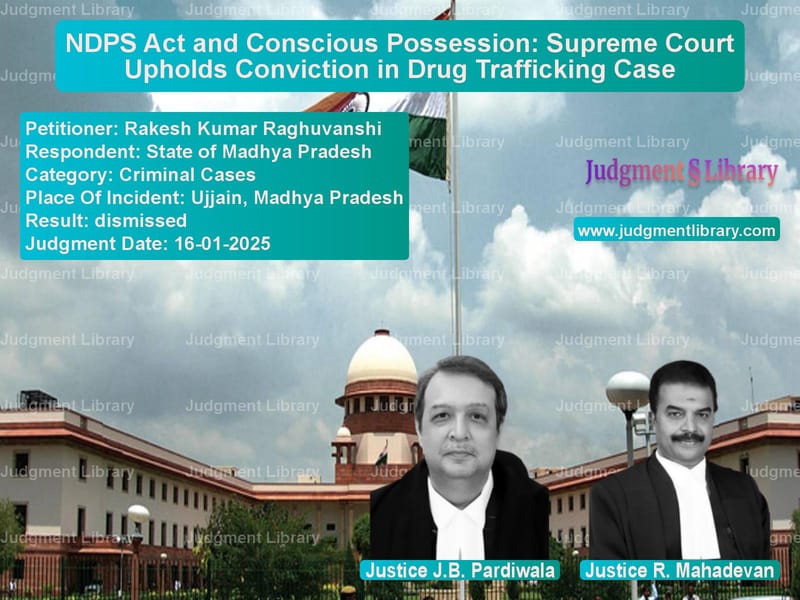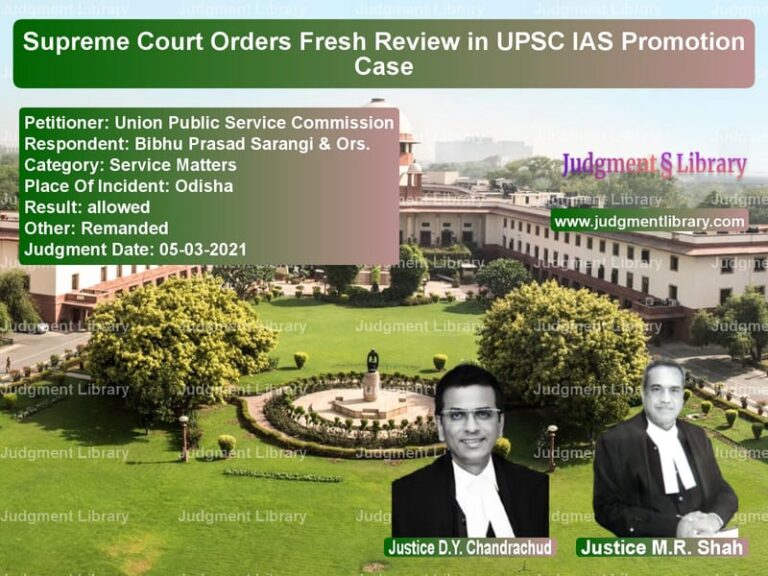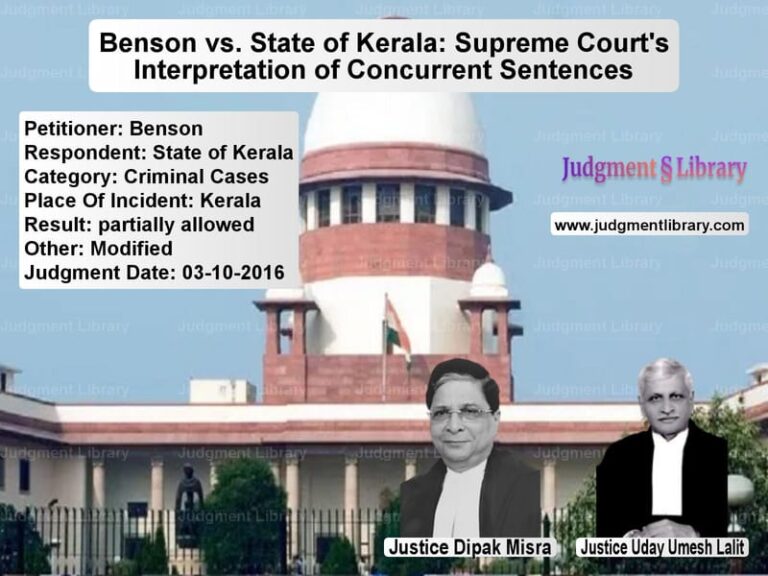NDPS Act and Conscious Possession: Supreme Court Upholds Conviction in Drug Trafficking Case
The case of Rakesh Kumar Raghuvanshi vs. The State of Madhya Pradesh presents an important legal precedent concerning the interpretation of ‘conscious possession’ under the Narcotic Drugs and Psychotropic Substances Act, 1985 (NDPS Act). The Supreme Court, in its judgment, upheld the conviction of the appellant, emphasizing the necessity of proving conscious possession in cases of drug-related offenses.
The appellant was convicted under Section 8 read with Section 15 of the NDPS Act for being found in possession of 50 kg of poppy husk. The case, which originated in Madhya Pradesh, involved extensive legal arguments over whether the accused had ‘conscious possession’ of the contraband. The Supreme Court reaffirmed the principle that once possession is established, the burden shifts to the accused to provide a satisfactory explanation.
Background of the Case
The appellant, Rakesh Kumar Raghuvanshi, was arrested based on an FIR registered by ASI Musharraf Beg at the G.R.P. Ujjain police station on December 30, 1996. Acting on a tip-off, the police intercepted the appellant on the Bhopal-Rajkot Express train. He was found in possession of three large cartons containing poppy husk.
The police documented the seizure and initiated proceedings under the NDPS Act. The Trial Court found him guilty and sentenced him to 10 years of rigorous imprisonment along with a fine of Rs. 1,00,000. The High Court upheld this conviction. The appellant then challenged the decision before the Supreme Court.
Arguments of the Parties
Petitioner’s (Appellant’s) Arguments:
- The appellant argued that he was falsely implicated in the case.
- He claimed that he was a legitimate traveler with a valid ticket and had no knowledge of the contraband.
- The cartons could have belonged to someone else as the search was conducted in a public place.
- He was merely following police instructions when he stepped down from the train with the cartons.
Respondent’s (State of Madhya Pradesh) Arguments:
- The prosecution argued that the appellant was in conscious possession of the poppy husk.
- The police had received specific information about the accused transporting narcotic substances.
- The appellant was found sitting on one of the cartons, and the other two were placed beside him.
- The search and seizure were conducted following legal procedures.
Supreme Court’s Observations and Judgment
The Supreme Court upheld the conviction and rejected the appellant’s arguments, making the following key observations:
- Conscious Possession: The Court emphasized that conscious possession is a crucial factor under the NDPS Act. Since the appellant was sitting on one of the cartons and had the other two placed next to him, it was sufficient to establish possession.
- Burden of Proof: Under Section 54 of the NDPS Act, once possession is established, the accused must provide a satisfactory explanation. The appellant failed to do so.
- Presumption of Culpability: As per Section 35 of the NDPS Act, the burden shifts to the accused to prove the absence of intent or knowledge regarding the possession of contraband.
- Reliance on Legal Precedents: The Court referred to previous rulings in Avtar Singh v. State of Punjab and Madan Lal v. State of Himachal Pradesh, reinforcing the principle that once possession is established, the accused bears the responsibility to disprove the charge.
Detailed Legal Analysis
The concept of conscious possession has been consistently upheld by Indian courts. The Supreme Court reiterated that ‘possession’ does not merely mean physical custody but also the mental state of awareness regarding the presence of a narcotic substance.
As per Section 54, unless an accused can prove otherwise, it is presumed that he is guilty of possessing the contraband. This principle was reaffirmed in Abdul Rashid Ibrahim Mansuri v. State of Gujarat, where the burden of proving lack of knowledge was placed upon the accused.
The Court ruled that the circumstances in which the appellant was found indicated that he had full knowledge and control over the contraband. The appellant’s defense that he merely stepped down from the train with the cartons under police instructions was found to be unconvincing.
Final Judgment and Directions
The Supreme Court dismissed the appeal, holding that the High Court had correctly upheld the Trial Court’s conviction. The appellant was directed to surrender within eight weeks to serve the remaining sentence.
Impact of the Judgment
- The ruling reinforces the strict interpretation of possession under the NDPS Act.
- It establishes that mere presence with contraband is sufficient to shift the burden of proof onto the accused.
- It highlights the importance of specific intelligence in drug-related arrests.
- The case serves as a precedent for future trials under the NDPS Act.
Conclusion
The judgment in Rakesh Kumar Raghuvanshi vs. The State of Madhya Pradesh underscores the stringent provisions of the NDPS Act. The Supreme Court’s ruling reiterates that the prosecution must establish conscious possession, after which the burden shifts to the accused to prove otherwise.
For individuals accused under the NDPS Act, this case serves as a stark reminder of the strict legal provisions surrounding narcotics possession. The ruling highlights the judicial system’s commitment to curbing drug trafficking while ensuring that legal procedures are meticulously followed.
Petitioner Name: Rakesh Kumar Raghuvanshi.Respondent Name: State of Madhya Pradesh.Judgment By: Justice J.B. Pardiwala, Justice R. Mahadevan.Place Of Incident: Ujjain, Madhya Pradesh.Judgment Date: 16-01-2025.
Don’t miss out on the full details! Download the complete judgment in PDF format below and gain valuable insights instantly!
Download Judgment: rakesh-kumar-raghuva-vs-state-of-madhya-prad-supreme-court-of-india-judgment-dated-16-01-2025.pdf
Directly Download Judgment: Directly download this Judgment
See all petitions in Drug Possession Cases
See all petitions in Judgment by J.B. Pardiwala
See all petitions in Judgment by R. Mahadevan
See all petitions in dismissed
See all petitions in supreme court of India judgments January 2025
See all petitions in 2025 judgments
See all posts in Criminal Cases Category
See all allowed petitions in Criminal Cases Category
See all Dismissed petitions in Criminal Cases Category
See all partially allowed petitions in Criminal Cases Category







